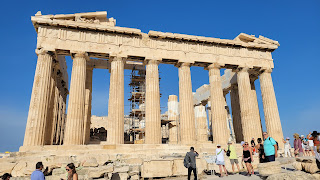Living the Legacy of Greece
Recently I read an amusing account of sixth grade answers on a
history test. It gave me a laugh but also reminded me of how strangely we
interpret the past when context or background knowledge is missing.
One student wrote, “The Greeks were a highly sculptured people
and without them we wouldn’t have history. The
Greeks also had myths. A myth is a female moth.” Another gave Socrates a sparce
obituary when he wrote, “Socrates was a famous Greek teacher who went around
giving people advice. They killed him.”
My own superficial views became evident on recent trip my wife
and I took to Greece. We were among the
million American tourists who arrive annually to explore the Parthenon and
other so-called ruins. Our bus
excursions reminded me of peeling the petals off an artichoke. Each petal’s
morsel took us closer to the historical heart of the country.
The Parthenon dominates the skyline of Athens. It sits on a
football-field sized platform called an acropolis. Considered the center of
religious life in the city-state, the columned main temple, built more than
2,500 years ago, was constructed in honor of Athena, the goddess of wisdom,
arts, literature, and war. Numerous sculptured human images, some still bearing
original pigments and adorned with still fashionable clothing, are stored in a
nearby museum.
We journeyed to Olympia, the birthplace of today’s Olympics. The
place features acres of crumbled training facilities, temples, monuments,
sanctuaries, and the buried outline of a big stadium. Originally built in 776
BCE, the site was dedicated to the worship of gods and athletic competition.
Separate temples were erected for Zeus, the king of all gods, and Hera, the
queen of the gods and goddess of women and marriage.
Every four years for centuries, the site drew competitors from
dozens of Greek city-states, just as our current Olympics globally attracts
athletes. However, back then only men competed; winning an event was a huge
political honor (sometimes primed with bribes); athletes competed in the nude;
a false start could trigger the death penalty.
A bus trip northward took us to the mountainous Oracle at
Delphi. Considered the center of the earth by ancient Greeks, the main purpose
of its temples was to honor Apollo, the god of prophesy, music, poetry, and
knowledge. One could not communicate with him directly, so to predict the
future a bridge between the human and the divine was necessary. The solution
was a middle-aged female priestess seer named Pythia. Once a month she would
foretell the future by breathing in potent fumes expelled by a fissure in the
earth. After falling into a trance, she would scream unintelligible predictions
which were translated by attending priests. A number of city-states
maintained treasuries on the site because gifts to Apollo were expected for
advice, especially in times of war or political upheaval.
Ruins attract thousands of tourists everywhere in Greece. New
archeological discoveries appear every week. Why have disintegrated columns,
walls, and statues become such magnets?
A little research brings reasons to light. The ruins tell
fascinating stories about the country’s culture and values. Greek mythology,
with its many legends about gods and goddesses, heroes and monsters, warriors and fools, is a vital cultural signature of
the country. In the so-called Dark Age of Greece (about 1200 to 800 BCE), there
was no written language, so story tellers used myths and legends to give
meaning to everyday lives. Today’s ruins retell those stories.
Another reason for the sustained appeal of Greece is not just
that it is indeed ancient, but that it still tells us so much about ourselves.
It is impossible to identify any aspect of western civilization, and American
life in particular, that has not been influenced by the ancient doings of
Greece. The implications include our arts and architecture, political and legal
institutions (including democracy and trial by jury), language and education,
agriculture and philosophy, medicine and health,
and (of course) athletics.
The sites we saw were visually awe-inspiring and even
entertaining. Tourists support an estimated quarter of Greece’s economy, and we
saw crowded evidence of it. Our bonus in
the months afterward has been a deeper understanding from thinking and reading
about Greece’s gifts to western civilization.
After thousands of years, often without realizing it, we are living her
legacy.

No comments:
Post a Comment